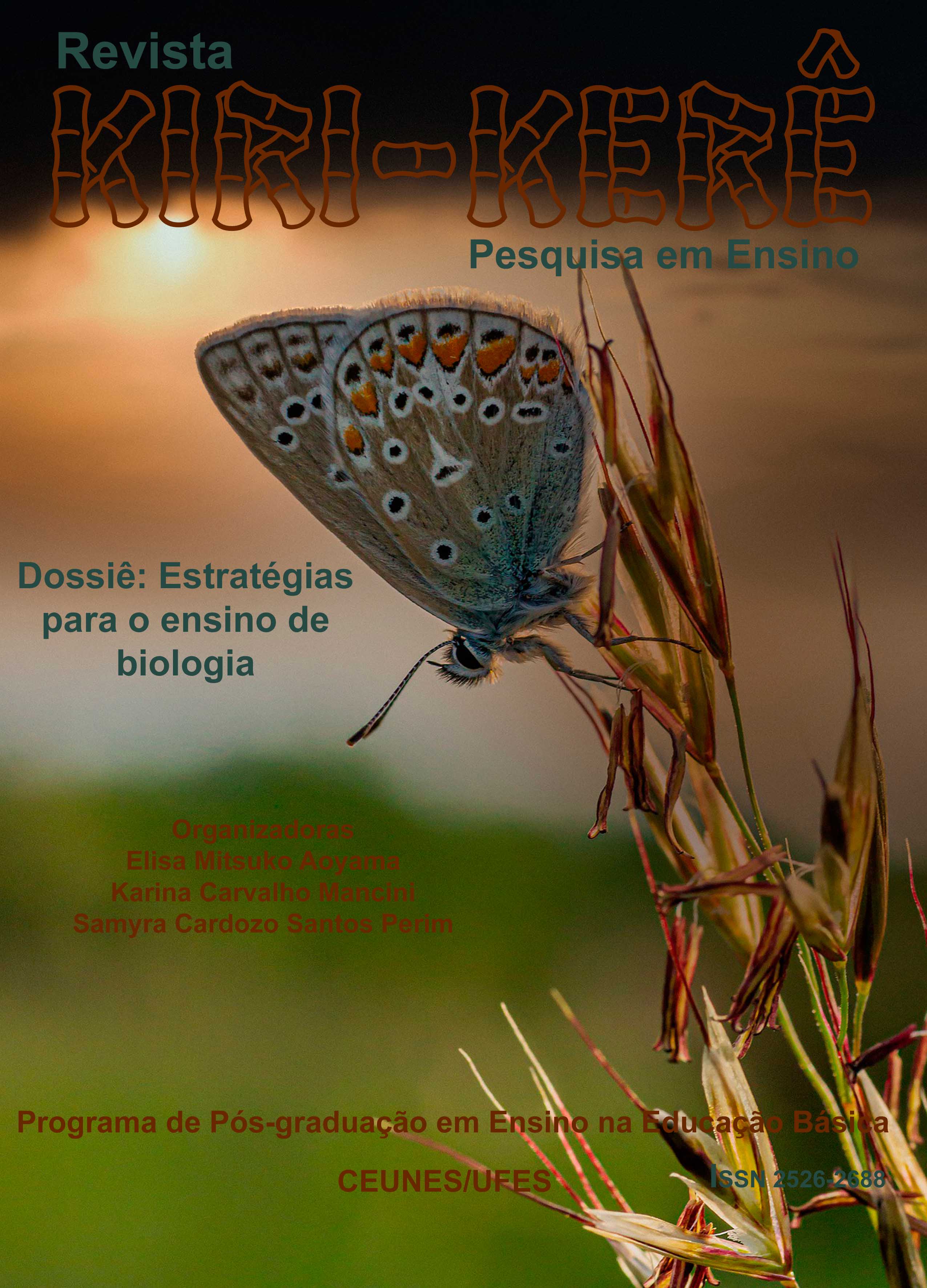My metabolism that fights!
Knowing the carbon way to Energy generation in the cell
DOI:
https://doi.org/10.47456/krkr.v1i13.36633Keywords:
cellular energy; interrelationship between chemistry and biology; basic education; teaching biochemistry; teaching by investigation; scientific methodAbstract
Biochemistry aims to clarify the biological form and role of the chemical mechanisms and processes that occur in organisms. The set of all chemical transformations found in living organisms is called metabolism. Most living things obtain energy through metabolic processes that involve the oxidation of carbon from carbonaceous nutrients. The understanding of how these biochemical reactions work is important for the understanding of the dynamics between the environment and organisms for the processes of obtaining energy and producing molecules, however, such knowledge occurs superficially within the schools, in a little explored way. This paper aims to present a proposal for an investigative activity to be applied to high school students, aiming at the understanding of the interactions between the ways of obtaining biochemical organic compounds and energy production in cells, with the understanding of the related chemical and biological processes; moreover, the activity enables the stimulation of criticality in the development of the scientific method from the guiding question: "How does the car engine work? The proposal is to develop an Investigative Teaching Sequence about the processes of obtaining energy in the cell, in order to involve students in analysis and discussion, from the problematization and subsequent raising of hypotheses and research, culminating with the production of an illustrated puzzle about the metabolic processes involved in the discussion.
Downloads
References
BARBOSA, J. B. N. Ensino da bioquímica por meio de uma rede social educacional para alunos do ensino médio. Dissertação de mestrado, UFRN, RN. 2016.
BRASIL. Ministério da Educação. Base Nacional Comum Curricular. Brasília: MEC. 2017
BRASIL. Ministério da Educação. Secretaria de Educação Média e Tecnológica. Parâmetros Curriculares Nacionais: Ensino Médio. Brasília: Ministério da Educação, 2002.
BRASIL. Secretaria da Educação Básica. Orientações Curriculares para o Ensino Médio. Ciências da Natureza, Matemática e suas Tecnologias. Vol. 2. Brasília: Ministério da Educação, 2006. 135p.
CARVALHO, A. M. P. de. Fundamentos teóricos e metodológicos do ensino por investigação. Revista Brasileira de Pesquisa em Educação em Ciências, p. 765-794, 2018.
CARVALHO, A. M. P. de. O ensino de ciências e a proposição de sequências de ensino investigativas. In: CARVALHO, A. M. P. de et al. Ensino de ciências por investigação: condições para implementação em sala de aula. São Paulo: Cengage Learning, 2013. p.156.
GARCEZ, E. S. C.; SOARES, M. H.; SOARES, F. B. Um estudo do Estado da Arte sobre a utilização do lúdico em ensino de química. Revista Brasileira de Pesquisa em Educação em Ciências, v. 17, n.1, p. 183-2014, 2017.
GOMES, K. V. G.; RANGEL, M. Relevância da disciplina bioquímica em diferentes cursos de graduação da UESB, na cidade de Jequié. Revista Saúde Com. Vitória da Conquista, v. 2, n. 1, p. 161-168, 2006.
GOMES, L. M. J. B.; MESSEDER, J. C. Fotossíntese e Respiração Aeróbica: vamos quebrar a cabeça? Proposta de jogo. Revista de Ensino de Bioquímica, [S.l.], v. 12, n. 2, p. 91-107, out. 2014. ISSN 2318-8790. Disponível em: <http://bioquimica.org.br/revista/ojs/index.php/REB/article/view/317>. Acesso em: 12 set. 2021. https://doi.org/10.16923/reb.v12i2.317.
HENRIQUES, L. R.; KONIG, I. F. M.; DIAS, B. K. M.; BAGNO, F. F.; SANTOS, R. C. V.; LEITE, J. P. V. Bioquímica nas escolas: Uma estratégia educacional para o estudo de Ciência no Ensino Médio. Revista Elo- Diálogos em Extensão, v. 5, n. 3, p. 6-17, 2016.
JESUS, M. S. de et al. Mapeamento das tecnologias digitais da informação e comunicação (tdics) publicadas na revista brasileira de ensino de bioquímica (2017 - 2019). Anais VI CONEDU... Campina Grande: Realize Editora, 2019. Disponível em: <http://www.editorarealize.com.br/index.php/artigo/visualizar/61027>. Acesso em: 12/09/2021 21:57
LEHNINGER, A.L.; COX M. M.; NELSON, D. L. Princípios de Bioquímica de Lehninger. 6. ed. Artmed: Porto Alegre, RS. 2014.
LINHARES, S.; GEWANDSZNAJDER, F.; PACCA, H. Biologia Hoje. 3. ed. São Paulo: Ática, 2016.
MOTOKANE, M. T. Sequências didáticas investigativas e argumentação no ensino de ecologia. Ensaio Pesquisa em Educação em Ciências (Belo Horizonte), [s.l.], v. 17, n., p. 115-138, nov. 2015. FapUNIFESP (SciELO). http://dx.doi.org/10.1590/1983-2117201517s07.
SARMENTO, A.C.H. et al. Investigando princípios de design de uma sequência didática sobre metabolismo energético. Ciência & Educação, v. 19, n. 3, p. 573-598, 2013.
SASSERON, L. H. Alfabetização científica, ensino por investigação e argumentação: relações entre ciências da natureza e escola. Ensaio Pesquisa em Educação em Ciências (Belo Horizonte), [S.L.], v. 17, n. , p. 49-67, nov. 2015. FapUNIFESP (SciELO). http://dx.doi.org/10.1590/1983-2117201517s04.
SCARPA, D. L; CAMPOS, N. F. Potencialidades do ensino de Biologia por Investigação. Estudos Avançados, [S.L.], v. 32, n. 94, p. 25-41, dez. 2018. FapUNIFESP (SciELO). http://dx.doi.org/10.1590/s0103-40142018.3294.0003.
SILVEIRA COVIZZI, U. D.; LOPES DE ANDRADE, P. F. Estratégia para o ensino do metabolismo dos carboidratos para o curso de farmácia, utilizando metodologia ativa de ensino. Revista de Ensino de Bioquímica, [S.l.], v. 10, n. 1, p. 10-22, dez. 2012. ISSN 2318-8790. Disponível em: <http://bioquimica.org.br/revista/ojs/index.php/REB/article/view/169>. Acesso em: 12 set. 2021. doi:https://doi.org/10.16923/reb.v10i1.169.
SOLNER, T. B.; FERNANDES, L. da S.; FANTINEL, L. O ensino de Bioquímica: uma investigação com professores da rede pública e privada de ensino. Revista Thema, [S. l.], v. 17, n. 4, p. 899-911, 2021. 10.15536/thema.V17.2020.899-911.1591. Disponível em: https://periodicos.ifsul.edu.br/index.php/thema/article/view/1591. Acesso em: 12 set. 2021.
VASCONCELOS, L.C., BONELLI, R.R. Desenvolvimento de um jogo de tabuleiro destinado a aumentar o nível de aprendizado e interesse do aluno pelo metabolismo energético no ensino médio. In: Anais do XII Encontro Latino Americano de Iniciação Científica e VIII Encontro Latino Americano de Pós-Graduação – Universidade do Vale do Paraíba. 2008. p. 1-4.
Downloads
Published
Issue
Section
License
The authors accept, when sending their works, the assignment of their copyrights.

